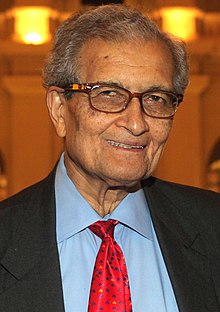Amartya Sen | |
|---|---|
 Sen in 2012 | |
| Born | Amartya Kumar Sen 3 November 1933 |
| Spouses | |
| Children | 4, including Nandana and Antara |
| Awards |
|
| Academic background | |
| Alma mater | |
| Doctoral advisor | Joan Robinson |
| Influences | |
| Academic work | |
| Discipline |
|
| Sub-discipline | |
| School or tradition | Capability approach |
| Institutions | |
| Doctoral students | |
| Notable works |
|
| Notable ideas |
|
| Influenced | |
Amartya Kumar Sen (Bengali pronunciation: [ˈɔmortːo ˈʃen]; born 3 November 1933) is an Indian economist and philosopher. Sen has taught and worked in England and the United States since 1972. In 1998, Sen received the Nobel Memorial Prize in Economic Sciences for his contributions to welfare economics.[6] He has also made major scholarly contributions to social choice theory, economic and social justice, economic theories of famines, decision theory, development economics, public health, and the measures of well-being of countries.
Sen is currently the Thomas W. Lamont University Professor, and Professor of Economics and Philosophy at Harvard University.[7] He previously served as Master of Trinity College at the University of Cambridge.[8] In 1999, he received India's highest civilian honour, Bharat Ratna, for his contribution to welfare economics. The German Publishers and Booksellers Association awarded him the 2020 Peace Prize of the German Book Trade for his pioneering scholarship addressing issues of global justice and combating social inequality in education and healthcare.
- ^ Sen, Amartya (2010). The Idea of Justice. London: Penguin. ISBN 9780141037851.
- ^ Deneulin, Séverine (2009). "Book Reviews: Intellectual Roots of Amartya Sen: Aristotle, Adam Smith and Karl Marx". Journal of Human Development and Capabilities. 10 (2): 305–306. doi:10.1080/19452820902941628. S2CID 216114489.
- ^ Kanbur, Ravi (July 2009). "Amartya Sen: A Personal Appreciation". Yumpu.
- ^ Bandyopadhyay, Taradas; Xu, Yongsheng (2021). "Prasanta K. Pattanaik". In Fleurbaey, Marc; Salles, Maurice (eds.). Conversations on Social Choice and Welfare Theory. Vol. 1. Springer. pp. 243–258.
- ^ Nayak, Purusottam (2000). "Understanding the Entitlement Approach to Famine". Journal of Assam University. 5: 60–65.
- ^ "The Sveriges Riksbank Prize in Economic Sciences in Memory of Alfred Nobel 1998". NobelPrize.org. Retrieved 20 May 2024.
- ^ "University Professorships". Harvard University. Retrieved 31 October 2019.
- ^ "The Master of Trinity". University of Cambridge. Archived from the original on 27 February 2021. Retrieved 27 December 2020.